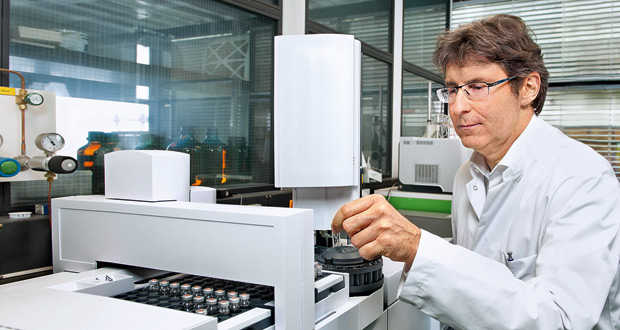RAG Aktiengesellschaft, Essen/Germany, has initiated a pilot study on the possible exposure of miners to PCB. The impetus for the study was the question as to whether exposure that took place many years ago, i.e. resulting from the use of liquids containing PCB in mining until the 1980s, can be reliably detected in the blood. A new detection method was developed under the scientific leadership of the Institute for Occupational, Social and Environmental Medicine (IASU) at the RWTH Aachen University hospital.
A total of 210 miners took part in the pilot study. Participants were selected randomly from a previously identified group of employees – miners active between 1947 and 1968 who had previously been in contact with liquids containing PCB. Participation was voluntary. 96 of the 210 miners were found to have been more heavily exposed to PCB while they were working than the general population. “The pilot study suggests that in years past, these miners were more heavily exposed to PCB. There is no acute risk to health according to currently applicable guide values,” explains IASU Professor Thomas Kraus (Figure 1). Exposure was not limited to any one mine.
The study did not indicate any correlation between increased PCB exposure and possible secondary illnesses. “The results show that there is no acute risk to the health of the miners who took part in the study,” emphasises RAG Deputy Chairman Peter Schrimpf. “They do show, however, that miners were previously exposed to high levels of PCB and that further research is required.”
Participants in the pilot study were offered medical support. “We encouraged participants to undergo examinations in order to reduce possible health effects to a minimum,” says Barbara Schlüter, Chair of the RAG General Works Council.
Every stage of the study was conducted in close coordination with an extensive steering committee, who developed the scientific concept for a possible study and clarified data protection issues. It was also important to consider whether gaining knowledge through the study outweighed any possible apprehension on the part of the miners. The ethics committee at RWTH came to the conclusion that the study could be carried out provided participants were offered follow-up care.
A new method was developed for the study under the scientific leadership of the IASU of the RWTH Aachen University hospital.
A total of more than 1,000 miners were invited to participate in the study. The 210 participants agreed to have their medical history examined in detail and to give blood samples.
Participants in this pilot study were offered medical support in order to identify any possible health impairments. The experts studied specific blood levels and organs that are susceptible to change as a result of PCB-related illnesses.
It would only be possible to determine whether or not there is a correlation between previous exposure to PCB and any subsequent illnesses suffered by miners by carrying out a large-scale follow-up study with several thousand participants. The steering committee responsible for initiating the pilot study will be meeting again to determine the feasibility and possible framework conditions for such a follow-up study.
Following a disaster in a Belgian mine in the 1950s, the mining authorities instructed all mining companies to switch to difficult-to-ignite hydraulic oils, which contained PCB at that time. In the period from the mid-1960s to 1986, hydraulic oils containing PCB were used underground for fire safety reasons. At that time, the hazard potential of PCB was still unknown. After scientific findings indicated that PCB could harm both health and the environment, RAG immediately replaced the liquids in question with alternatives. (RAG/Si.)



